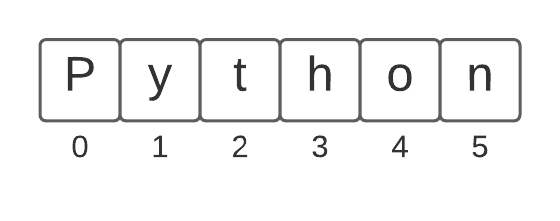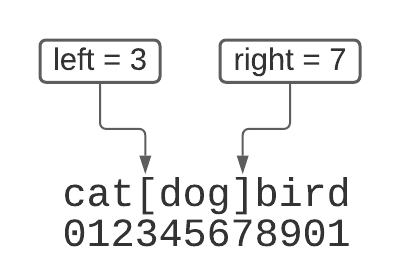More strings
Concepts from last time
- strings indexed starting from zero
- get a character with square brackets
s[0] or s[i]
len(s) — length of a string- various string functions like
s.isalpha()

str_dx(s) and the accumulator pattern
def str_dx(s):
result = ''
for i in range(len(s)):
if s[i].isdigit():
result += 'd'
else:
result += 'x'
return result
str_dx("I'm 91. You call me old??! I'm wise and experienced!")
'xxxxddxxxxxxxxxxxxxxxxxxxxxxxxxxxxxxxxxxxxxxxxxxxxxx'
count_e(s) problem and the accumulator pattern
- count the number of ‘e’ characters in a string
- accumulator pattern using an integer variable
def count_e(s):
count = 0
for i in range(len(s)):
if s[i] == 'e':
# count = count + 1
count += 1
return count
result = count_e('abcdefg')
print(result)
result = count_e('abcdefgeabce')
print(result)
1
3
has_alpha(s) function, early return pattern, doctests
def has_alpha(s):
"""
Returns true if there are any alphabetic characters in the string, false otherwise.
:param s: a string
:return: True if there are alphabetic characters in s, otherwise False
>>> has_alpha('45#a8e')
True
>>> has_alpha('45^#)-')
False
"""
for i in range(len(s)):
if s[i].isalpha():
return True
return False
if statements
if something_is_true:
do_things()
else:
do_other things()
if not something_is_true:
do_things()
if first_check:
do_first_things()
elif second_check:
do_second_things()
elif third_check:
do_third_things()
else:
do_fourth_things()
in test
- check for presence of a string in another string
- also a
not in variant
'Dog' in 'CatDogBird'
'dog' in 'CatDogBird' # upper vs. lower case
'd' in 'CatDogBird' # finds d at the end
'i' in 'CatDogBird' # finds lower case characters
'x' in 'CatDogBird' # returns false if not found
'x' not in 'CatDogBird' # also have a "not in" variant
s = 'my birthday party'
if 'birth' in s:
print('birth is in this string')
has_pi(s) function
def has_pi(s):
""" return true if "3" and "14" are in the string (not necessarily next to each other)
"""
if '3' in s and '14' in s:
return True
return False
print(has_pi('3.1415'))
print(has_pi('Today is the 3rd time in 14 days that I have slept until 10am.'))
print(has_pi('Which 3 players are your favorite?'))
True
True
False
find_cat(s) function
- look for instances of ‘c’, ‘a’, ‘t’, ‘C’, ‘A’, ‘T’
- return a new string that has just these characters, in the order they appear
| s | return value |
|---|
| xCtxxxAax | CtAa |
| xaCxxxTx | aCT |
find_cat(s) attempt #1
- misses the capital letters
def find_cat(s):
"""
>>> find_cat('xCtxxxAax')
'CtAa'
>>> find_cat('xaCxxxTx')
aCT
"""
result = ''
for i in range(len(s)):
if s[i] == 'c' or s[i] == 'a' or s[i] == 't':
result += s[i]
return result
print(find_cat('xCtxxxAax'))
print(find_cat('xaCxxxTx'))
ta
a
find_cat(s) attempt #2
- do 6 comparisons!
- works but it is ugly
find_cat(s) attempt #3
- convert character to lowercase first (doesn’t modify the original string)
- makes it easier to test without having to write 6 comparisons
- still a long comparison
def find_cat(s):
result = ''
for i in range(len(s)):
if s[i].lower() == 'c' or s[i].lower() == 'a' or s[i].lower() == 't':
result += s[i]
return result
print(find_cat('xCtxxxAax'))
print(find_cat('xaCxxxTx'))
find_cat(s) attempt #3
- decompose with a varible
- compute
s[i].lower() once, store it in a variable
- avoids repetition
- code is easier to read
- decomposition within a function — do small pieces at a time
def find_cat(s):
result = ''
for i in range(len(s)):
low = s[i].lower() # decompose with a variable
if low == 'c' or low == 'a' or low == 't':
result += s[i]
return result
print(find_cat('xCtxxxAax'))
print(find_cat('xaCxxxTx'))
CtAa
aCT
a note on variable names
- don’t use ‘lower’ — duplicates a function name
- could use ‘lower_case_char’ — something descriptive
- use underscores between words
find_cat(s) attempt #4
- can make this a little bit simpler
- instead of three comparisons, use
low in 'cat'
def find_cat(text):
result = ''
for index in range(len(text)):
low = text[index].lower()
if low == 'c' or low == 'a' or low == 't':
if low in 'cat':
result += text[index]
return result
print(find_cat('xCtxxxAax'))
print(find_cat('xaCxxxTx'))
CtAa
aCT
s.find(target)
- find a
target string inside of s
- returns the index where it is found
- returns -1 if not found
s = 'Python'
print('th: ',s.find('th'))
print('o: ',s.find('o'))
print('y: ',s.find('y'))
print('x: ', s.find('x'))
print('N: ',s.find('N'))
print('P: ',s.find('P'))
th: 2
o: 4
y: 1
x: -1
N: -1
P: 0
String slicing
- get a substring from a string
- used very heavily
- use brackets and then
start_index:end_index
- returned string is from
start_index to end_index-1
s = 'cats and dogs'
s[0:4]
'cats'
s[2:6]
'ts a'
s[9:13]
'dogs'
can leave off either the start or the end indexing
- if you leave off the start, it starts at the start (0)
- if you leave off the end, it ends at the end (
len(s))
s = 'cats and dogs'
s[0:4]
s[:4]
'cats'
s[9:13]
s[9:]
'dogs'
edge cases
s = 'cats and dogs'
s[3:3] # starting and ending the same -> empty string
''
s[9:999] # ending too big -> end
'dogs'
s[:] # the whole string
'cats and dogs'
s[5:-2] # negative numbers at the end counts backward from the end
'and do'
''
brackets(s) problem
- look for a pair of brackets ’[…]’ within s
- return the text between the brackets
- if there are no brackets, return the empty string
- assume if there is a left bracket, there will always be a right bracket after
it
- assume if brackets are present, there will be only one of each
| s | return value |
|---|
| ‘cat[dog]bird’ | ‘dog’ |
| ‘catdogbird’ | ” |
draw it out!
- find the index of the left bracket and the right bracket

brackets(s) solution
def brackets(s):
left = s.find('[')
if left == -1:
return ''
right = s.find(']')
if right == -1:
right = len(s)
return s[left+1:right]
result = brackets('cat[dog]bird')
print(result)
result = brackets('catdogbird')
# this prints the empty string
print(f"[{result}]")
result = brackets('cat[dogbird')
print(result)
dog
[]
dogbird
s.find(target, start_index)
- find
target inside the string, but starting at start_index
s = '[xyz['
s.find('[') # find first [
0
s.find('[', 1) # start search at 1
4
parens(s) problem
- like brackets, but use parentheses
- may have other parentheses mixed in
- write this in PyCharm, with doctests
- can you help write the doctests?
| s | return value |
|---|
| ‘x)x(abc)xxx’ | ‘abc’ |
parens(s) solution
def parens(s):
"""
Return the substring that is inside the first set of matching parentheses
:param s: a string
:return: a substring that is inside the first set of matching parentheses
>>> parens('x)x(abc)xxx')
'abc'
"""
left = s.find('(')
right = s.find(')', left + 1)
return s[left+1:right]

